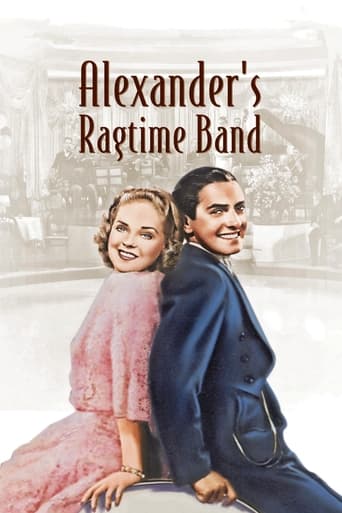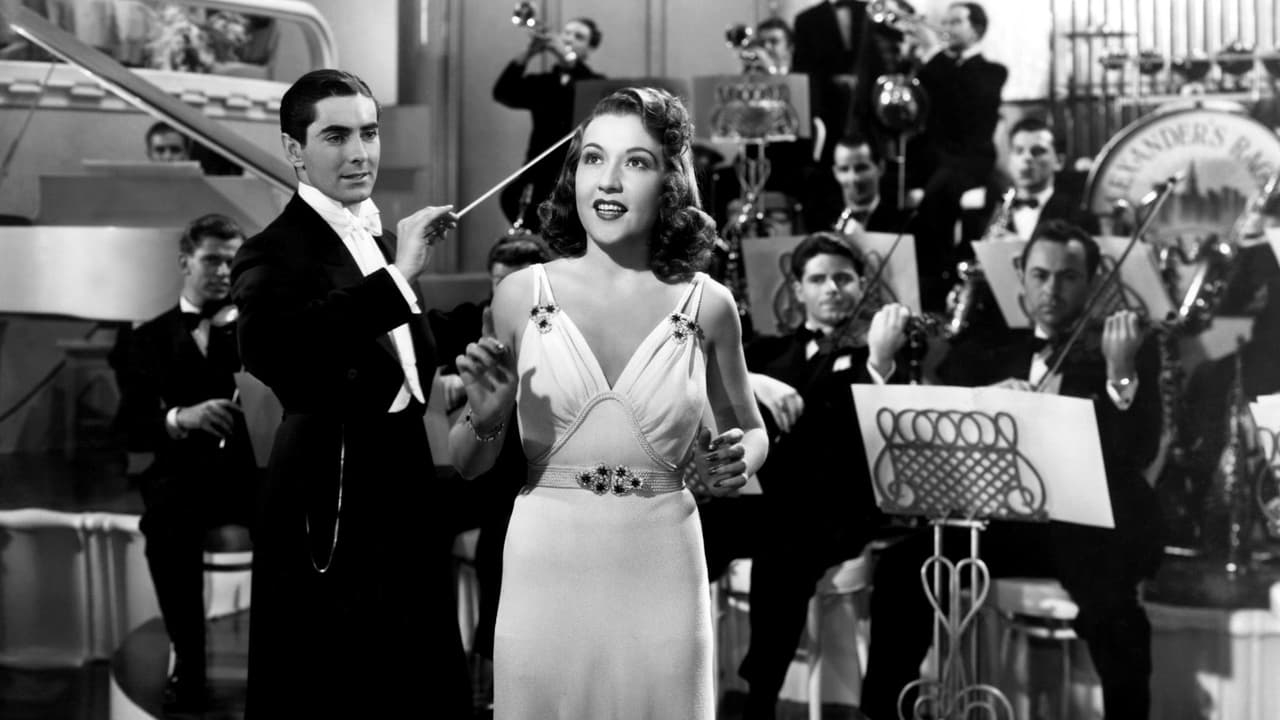jarrodmcdonald-1
The music is wonderful in this film, with a story pieced together using classic Irving Berlin songs. The chemistry of the leads-- Tyrone Power, Alice Faye, and Don Ameche-- can be described as sweet (though a little too sugary if you are not a romantic at heart or if you are on a cinematic diet). At times Alice Faye seems to be channeling Jean Harlow, but that is quickly forgiven when she starts to sing. Ethel Merman is also present and adds extra musical credibility to the proceedings.The best moment, in this writer's opinion, is when Miss Merman sings 'Blue Skies,' then Miss Faye goes up on stage and sings it with her and the others. But this is more than a hodgepodge of tunes, and there's an interesting storyline involving Faye and Power that takes several enjoyable, if not entirely unexpected, twists and turns. The film could be remade easily with modern musical stars. Why not? You cannot go wrong with the timeless quality of Berlin's music.
weezeralfalfa
Who first sang "Easter Parade" in the movies? Not Astaire and Garland(in '48), not Bing(in '42). Don Ameche sings it in this film, although it was first sung on stage in 1933. Although Berlin's best known musical extravaganzas were produced by MGM, Fox did 3, starting with this B&W one, all featuring Ethel Merman, among others. The other two("Call Me Madam" and "There's No Business Like Show Business") were made about 15 years after this. Although these later films were shot in color, and often had much more elaborate sets, by then Merman's singing voice had became more harsh and sometimes with excessive vibrato, and she had gained a few lbs. For example, compare Merman's brief rendition of "A Pretty Girl is Like a Melody" in the present film with her lavish rendition in "There's No Business..". Unfortunately, this latter Merman is the only one many people have been exposed to, thus they wonder why composers and many theater and film goers raved about her singing and acting. In the present film, we can see why. Although Alice Faye was the female star of this film, and gets most of the better singing roles, several of Merman's numbers had the most elaborate sets, probably reflecting her more stage-oriented style.Her major numbers were "Pack Up Your Sins and Go To The Devil", "Blue Skies", "My Walking Stick", "Everybody Step" and "Heat Wave". Marilyn Monroe famously did a very sensuous version of the latter in "There's No Business..." No way would the film censors of 1938 have passed that performance! Hence, we have Merman's relatively plain and simple, if spirited, version. Merman would get to do several of Faye's songs in either of her '50s Berlin films. You can compare Faye's rendition of "The International Rag" with Merman's in "Call Me Madam". Faye's "When the Midnight Choo Choo Leaves Alabam" was redone twice in "There's No Business..", as well as in "Easter Parade". In these performances, it was a man-woman duet, with a more elaborate stage set. Finally, the title song, although sung twice by Faye, actually consumed much more time in "There's No Business..", with much more elaborate multiple stagings, and in color.This film firmly established the typical Fox musical formula for the early '40s, with strong emphasis on 2 or 3 featured female singers/dancers/ comediennes. Along with the previous "King of Burlesque", this film also established the typical melodrama plot for most future Fox and many MGM musicals of the '40s and early '50s: romantic and professional ups and downs between the stars, with often a late switcheroo as to who ends up with whom, or a last minute reunion between two former lovers, who had separated for professsional or wartime reasons. For example, compare the plot of this film with that of the MGM "For Me and My Gal" of a few years later.The 3 major stars, Power, Ameche, and Faye were reunited after their popular union the previous year in "In Old Chicago". Unfortunately, the handsome and popular Power had zero musical talent, thus is relegated to faking violin playing or endlessly waving a baton in front of an orchestra, as Alexander. Like quite a few films of the '30s and early '40s, the story begins in a barbary coast dive in San Francisco, with a singer or show girl and the dive owner as the main characters. For example, compare the present story with MGM's "San Francisco" of the previous year, or the later Faye-starring "Hello, Frisco, Hello". Besides Merman, Jack Haley, Wally Vernon, Dixie Dunbar, and Chick Chandler were featured in a couple of songs and/or dances. Haley would play "'The Tin Man' in "The Wizard of Oz" the following year, but he otherwise failed to become a big star. Faye would continue as the female lead in a number of Fox musicals in the early '40s, with more musically inclined John Payne replacing Power, or with Ameche again. Carmin Miranda was enticed from Brazil to often play Merman's role as the alternative brassy female singer/dancer/comedienne. It was only after Fox's primary and secondary female musical stars had been released or retired that Merman was brought back, this time as the lead female. For a brief discussion of the careers of many of the other secondary players, check out the very good commentary on the current DVD release.To get a better appreciation of the strictness of the film moral codes at this time, it was very unusual for the subject of divorce to be allowed. Thus, the divorce between Faye's and Ameche's characters, while amiable, barely squeaked by the censors.This film lacks any top dancing specialist or lavish dancing choruses or sets of the Busby Berkely style. It also has limited comedic content, and many of the better songs were later filmed more lavishly and in color. Nonetheless, it's rather a fun time, with good chemistry between the actors. Only, it's too bad Faye's character spends so much time being sad or belligerent, while Merman is always smiling and upbeat.
MartinHafer
This film starred the top talent at Twentieth-Century Fox. Tyrone Power (who could not sing or play music), Alice Faye and Don Ameche star in this film directed by Henry King and featuring the music of Irving Berlin. Clearly it was a prestige film for the studio--a large budget film with high expectations for success.The film begins with Power playing sophisticated music for a crowd of high-class folks. Only moments later, however, he's playing Ragtime music for a crowd in a bar--and it's obvious that he's torn between the world of society and popular music. Quite by Hollywood accident, the feisty Alice Faye is pulled into Power's band and the way she and Power meet and get along is very clichéd--you know, the misunderstanding that results in them becoming enemies and you KNOW they'll be in love sooner or later! She is a low-class dame and over time, Power is able to polish her image and make her a success--along with his band. On hand is another cliché--the nice-guy friend (Ameche) who loves the girl but demurs when his friend and the dame become a pair. You almost feel sorry for Ameche getting such a thankless role as the 'nice' friend...though I am sure his enormous checks from the studio more than made up for this! And then there's the final big cliché when Faye and Power break up--only, naturally, to be reunited by the film's conclusion. The only question is what, exactly, will happen in between--and there are certainly a lot of twists that occur in the interim in their parallel journeys. WWI, another woman (a younger and amazingly pretty Ethel Merman), marriage and bootlegging all are among the things the film explores during this portion. And if all this seems familiar, it is if you've seen many Fox musicals. This plot, with a few changes, was used in "King of Burlesque" and many other films with Alice Faye.As for the film overall, it's pretty much what you expect from the studio--a lot of music (way too much, actually), a lot of polish and the best sets money can buy (Twentieth-Century Fox and MGM were the kings of such lavish productions). But, beneath all the polish, it is all formula and clichés--the sort of film that is pleasant but certainly not a must-see. Plus, oddly, the music, for the most part, isn't exactly Ragtime--often it's more the typical sort of musical numbers you'd see in just about any Fox production of the day.By the way, in the WWI portion, I noticed that some of the soldiers were amazingly old and fat. Were we THAT desperate for men?! And get a load of those devil-girl dancers at about the 75 minute mark!
Lechuguilla
For viewers who like Irving Berlin music, this is a film to watch. His songs are really the main attraction. But the story, which encompasses a group of musicians and their career changes, has an interesting series of romantic plot twists that is intriguing.The main character is Roger (Tyrone Power), a man who starts his career in a highbrow musical setting, but changes to more popular ragtime. The story is fictional, but Roger's character arc is inspired by the life of Irving Berlin.A big-budget film that was in production for almost two years, "Alexander's Ragtime Band" received a huge promotional build-up in 1938. And it was well received by audiences. Sets are lavish. B&W cinematography is competent. Casting and acting are acceptable overall. However, Tyrone Power is the only major actor who lacks musical talent, and it shows. Both Don Ameche and Jack Haley add luster. Alice Faye is adequate.The film is less constricted by plot than other musicals. But there's still a lot of dialogue. And, except for the title song and a quick version of "Easter Parade", the music is somewhat bland and uninteresting. I would have preferred more evocative music. The film's tone ranges from semi-bawdy to mushy romanticism.This is a large-scale, Americana period piece film, with an accent on the music of Irving Berlin. It is old fashioned, both in plot and in style. It's technically well made. But to me it's too removed in time from current culture to be anything other than historically quaint.


 AD
AD



